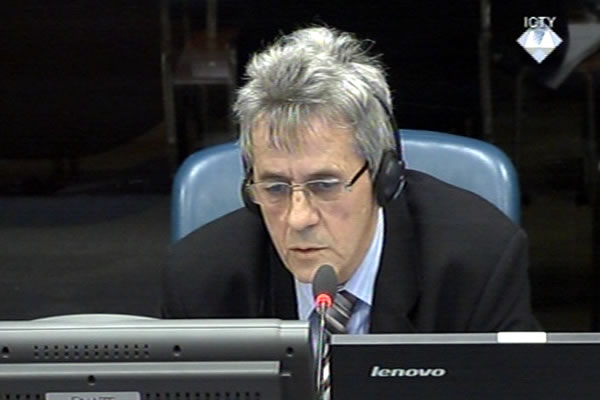Home
JOURNALIST RENOUNCES HIS WARTIME TEXTS
In his evidence at the trial of Radovan Karadzic, Mihajlo Orlovic renounced all his texts and reports published or broadcast on the radio during the war. As Orlovic explained, it was a ‘time of propaganda’ and editors rewrote his texts. Even today Orlovic still doesn’t believe that mass crimes were perpetrated against the non-Serb population in Sanski Most. According to Orlovic, they were ‘individual incidents’ of sick persons and drunkards
 Mihajlo Orlovic, witness at the Radovan Karadzic trial
Mihajlo Orlovic, witness at the Radovan Karadzic trial Mihajlo Orlovic gave evidence at the trial of Radovan Karadzic. Now a journalist with the RTRS, during the war Orlovic worked for the Serb Radio in Sanski Most. In his statement to Karadzic’s defense Orlovic stated that the Muslims were responsible for the first incidents in Sanski Most. This prompted the Crisis Staff to broadcast an appeal over the radio urging everyone to lay down the arms and military equipment. Some people ignored the call, Orlovic said. The women, children and elderly were told to come out of their houses in order for the premises to be searched for weapons. Also, Orlovic noted in his statement that many citizens of ‘all ethnic backgrounds’ left Sanski Most ‘because of poverty and lack of personal security prevalent in the war’, but ‘several thousand Muslims’ remained in Sanski Most municipality during the war. According to the 1991 census, there were 28,000 Muslims living in Sanski Most.
In the cross-examination, prosecutor Amir Zec put it to Orlovic that during the war he was ‘actively involved in spreading fear’ among the Serb population. Prosecutor Zec corroborated the claim with quotes from Orlovic’s wartime texts. In them Orlovic wrote about ‘clouds of dark foreboding’ and a new ‘genocide’ threatening the Serb nation once more after 1941, that ‘shouldn’t happen again’. Orlovic called the meetings with Muslim and Croat representatives ‘peace-mongering hogwash’; according to him their primary goal was to ‘tranquilize the Serb people’. In his texts, Orlovic wrote about some Muslim intellectuals, describing them as ‘not the brightest’, ‘fat and pumpkin-like’, ‘having pockmarked faces’ and the like. Orlovic now renounced all his previous war texts explaining that it was a time of ‘general propaganda’. ‘Everything I published during the war is questionable’, Orlovic replied to the prosecutor adding that his editors changed his texts and added various ‘epithets’.
In Orlovic’s opinion, the crimes against the non-Serbs in Sanski Most, as alleged in the indictment, were also questionable. Prosecutor Zec reminded him that the Serb forces shelled Mahala in late May 1992. Many citizens were killed and thousands of them were taken to prison camps. The prosecutor went on to ask Orlovic if he knew about the killing of Muslims in Mahala, Hrustovo and other non-Serb settlements. Orlovic replied that ‘various disinformation and rumors’ were doing the rounds at that time. Even today, after 20 years Orlovic didn’t believe those stories. According to Orlovic, there were incidents and individuals who were not part of the system were responsible for them. In the re-examination Orlovic told Karadzic that 1992 was a ‘red-hot year’. Individuals who were ‘sick’ or ‘under influence of alcohol’ were responsible for the crimes, Orlovic claimed.
Linked Reports
- Case : Karadzic
- 2014-02-05 POLICE FIRST ARMED CRIMINALS THEN HAD TO FIGHT THEM
- 2014-02-04 INVESTIGATION THAT COST WITNESS HIS JOB
- 2014-02-03 IF BOSNIAN SERB POLICE HAD BEEN PART OF INTERPOL…
- 2014-02-11 KARADZIC'S WITNESS BLAMES MILITARY FOR CRIMES IN FOCA PRISON
- 2014-02-12 KARADZIC NEEDS RECESS TO PREPARE HIS EVIDENCE
- 2014-02-12 WITNESS QUOTES NJEGOS
